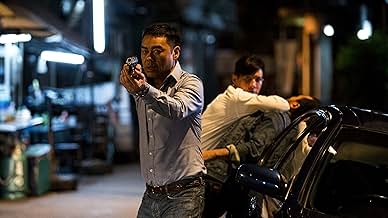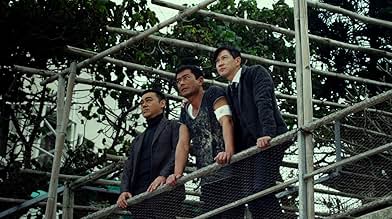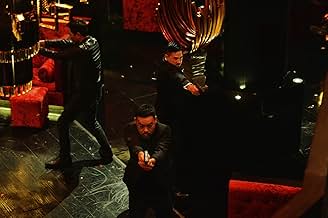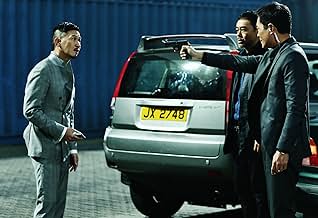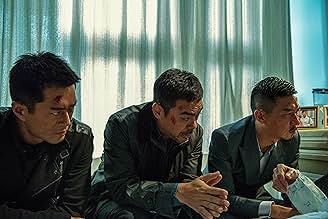A devastating dilemma changes the fate of three cops when an undercover operation against a notorious Thai drug lord goes horribly wrong.A devastating dilemma changes the fate of three cops when an undercover operation against a notorious Thai drug lord goes horribly wrong.A devastating dilemma changes the fate of three cops when an undercover operation against a notorious Thai drug lord goes horribly wrong.
- Awards
- 4 wins & 23 nominations total
Ching-Wan Lau
- Ma Ho-tin
- (as Sean Lau)
Ting Yip Ng
- Wong Shun-yik
- (as Ng Ting-Yip Berg)
Wai-Kwong Lo
- Bobby
- (as Kenneth Low)
Helena Law
- Tsz-wai's Mother
- (as Lan Law)
Treechada Petcharat
- Mina
- (as Poy)
Hugo Tsz-Hang Wong
- Monkey (Kun's Gang)
- (as Hugo Wong)
Siu-Kay Lee
- Kei (Informer)
- (as Siu-Kei Lee)
Featured reviews
"The White Storm" is a totally unreal movie about three Hong Kong narcotics cops trying to bring down a big time drug dealer. Director and co-writer Benny Chan should stick to directing. Chan's previous movie, 2011's "Shaolin," was a very well made movie that held your interest throughout. "The White Storm" is mainly a series of gunfights, very well choreographed but totally unreal. More a video game shoot-em up than a movie. In the middle of the movie, the HK cops are in Thailand to trap the drug lord. During an ensuing gun battle, the bad guys bring in a helicopter fitted with a mini-gun that blasts away at everything. For me, that was the high point of the movie, just mindless destruction with no shallow dialog from the three buddy cops. Benny Chan does a much better job as director when he works with Jackie Chan. For his next movie, Benny Chan should team up again with Jack Chan and leave the writing to others.
It has been a long time since I last watch a good heroic bloodshed genre flick. Nobody does it quite like John Woo in the 80s. The brotherhood is more important than romantic love or even familial love, the homo-heroic over-the-top orgasmic gun ballets and the prevailing notion of "to die a good death is beautiful." They are all here... I miss watching these action flicks that teach you how to be a man (one type of man) so much. The only major exponent now is Johnnie To but his emphasis on style robs the genre's quintessential central focus on loyalty and honor.
The White Storm totally surprised me and it is extremely entertaining from start to end. Prior to walking into the cinema, I really don't think much of it because it's another drug movie (Johnnie To's Drug War is still very fresh in my head) and it's a subject matter that is just too jaded. The only reason I wanted to watch this is because of the incredible heavyweight cast of Sean Lau, Nick Cheung and Louis Koo. These 3 awesome actors have never shared the big screen together. But from the get-go, Benny Chan, the director held on to my jugular and kept squeezing it with twists after turns.
The action set-pieces use the locations very well. From the night market streets of Mongkok, to dilapidated sleazy apartment blocks, to the forest of Thailand, the action is well-framed and shot. The sound design is out of this world - so much stuff is happening from the sides and in the surrounds. It would have been just plain stupid if it's just action for action's sake. No, Benny Chan always emphasizes the melodrama behind all the action pieces. One of the best shoot outs I have seen in recent years occurs at the end of the second act. Breathtaking... the see-saw shifting of power, empathetically seeing an officer get shot, all hell breaks loose, culminating to the heartbreaking scene where Sean Lau has to make the choice of his life. It's Hobson's choice really... any which way he chooses, the brotherhood disintegrates.
The acting? No need to say. The 3 of them play off each other very well. Of the 3 I enjoyed Nick Cheung's arc the most. He is a complete revelation in any role he has taken up. The ever dependent Sean Lau plays his character without histrionics but I could feel his pain. Just look at the scene where he has to make the Hobson's choice. A lesser actor would have over-acted, not Sean Lau. Then Louis Koo. He has definitely improved much in his acting but I do feel he got the short end of the 3 sticks.
The writing is quite inspired and for some reason it reminds me of John Woo's Bullet in the Head (1990). A simple 楚留香 recurring motif cements the entire narrative together. There was no need for too much homo-erotic knowing looks or nods to suggest the themes of loyalty and honor. My wife's favorite scene is when the 3 are at the hospital seeing Nick Cheung's mom for the last time. It is an incredibly written scene. I have seen so many of these death scenes but nothing like this. The words that spew out of their lips are amazingly poignant.
... and that last shoot out at the hotel. Oh man... bullet perforated faceless bodies pirouetting in a mist of smoke and red, heroes wielding 2 guns like wuxia exponents... I miss that so much. Sure, it's over the top but it's a movie and this heroic bloodshed genre has always made me a believer. I am a believer so true and through, I even wrote my dissertation on it . It would have been a masterpiece if the third act was tighter. It just felt a little bloated and over-long - a minor quibble.
If last year's Cold War which is just an opening act to a larger story won all the major HK awards, then The White Storm is going to sweep away everything this year. It is a much more accomplished action thriller with nobler aspirations.
The White Storm totally surprised me and it is extremely entertaining from start to end. Prior to walking into the cinema, I really don't think much of it because it's another drug movie (Johnnie To's Drug War is still very fresh in my head) and it's a subject matter that is just too jaded. The only reason I wanted to watch this is because of the incredible heavyweight cast of Sean Lau, Nick Cheung and Louis Koo. These 3 awesome actors have never shared the big screen together. But from the get-go, Benny Chan, the director held on to my jugular and kept squeezing it with twists after turns.
The action set-pieces use the locations very well. From the night market streets of Mongkok, to dilapidated sleazy apartment blocks, to the forest of Thailand, the action is well-framed and shot. The sound design is out of this world - so much stuff is happening from the sides and in the surrounds. It would have been just plain stupid if it's just action for action's sake. No, Benny Chan always emphasizes the melodrama behind all the action pieces. One of the best shoot outs I have seen in recent years occurs at the end of the second act. Breathtaking... the see-saw shifting of power, empathetically seeing an officer get shot, all hell breaks loose, culminating to the heartbreaking scene where Sean Lau has to make the choice of his life. It's Hobson's choice really... any which way he chooses, the brotherhood disintegrates.
The acting? No need to say. The 3 of them play off each other very well. Of the 3 I enjoyed Nick Cheung's arc the most. He is a complete revelation in any role he has taken up. The ever dependent Sean Lau plays his character without histrionics but I could feel his pain. Just look at the scene where he has to make the Hobson's choice. A lesser actor would have over-acted, not Sean Lau. Then Louis Koo. He has definitely improved much in his acting but I do feel he got the short end of the 3 sticks.
The writing is quite inspired and for some reason it reminds me of John Woo's Bullet in the Head (1990). A simple 楚留香 recurring motif cements the entire narrative together. There was no need for too much homo-erotic knowing looks or nods to suggest the themes of loyalty and honor. My wife's favorite scene is when the 3 are at the hospital seeing Nick Cheung's mom for the last time. It is an incredibly written scene. I have seen so many of these death scenes but nothing like this. The words that spew out of their lips are amazingly poignant.
... and that last shoot out at the hotel. Oh man... bullet perforated faceless bodies pirouetting in a mist of smoke and red, heroes wielding 2 guns like wuxia exponents... I miss that so much. Sure, it's over the top but it's a movie and this heroic bloodshed genre has always made me a believer. I am a believer so true and through, I even wrote my dissertation on it . It would have been a masterpiece if the third act was tighter. It just felt a little bloated and over-long - a minor quibble.
If last year's Cold War which is just an opening act to a larger story won all the major HK awards, then The White Storm is going to sweep away everything this year. It is a much more accomplished action thriller with nobler aspirations.
"The White Storm 2013" is the first of a trilogy of crime thrillers (the second and third are pretty mediocre). I would have given it a 6.7/10, but I rounded up and got 7. When I first watched it, I was gonna give it a 6/10, but it somehow upgraded by 0.7 points.
Anyway, summary. The movie is about three cops who have known each other since childhood, and are basically brothers. These three cops are Chow (Louis Koo), Tin (Sean Lau), and Wai (Nick Cheung). Chow is undercover, and ends up getting ditched by his wife (Yuan Quan) because of it. He's incredibly mad at his fellow brothers-in-arms, but is forced into a mission in the Golden Triangle to take down a notorious Thai-Cantonese drug lord named Eight Faced Buddha (Loi Ho Pang). The operation goes sour, and when Eight Faced Buddha resurfaces in Hong Kong, the three have to put the botched mission aside and work together to take him down.
The story itself is pretty good. The three stars are also very talented. It's a nice throwback to the heroic bloodshed era of the '80s Hong Kong films. The morals of the characters colliding with each other keeps your attention gripped for long enough, and the three protagonists are pretty fleshed out. But I'm gonna be honest, the direction was a bit...questionable.
Don't get me wrong, Benny Chan is a solid director. His final film, Raging Fire (with the goat Donnie Yen and Nicholas Tse), is an incredibly, high-stakes, tense, no-nonsense police thriller with some amazing action sequences, combined with a compelling protagonist and a badass and equally compelling antagonist. However, the White Storm...doesn't tick all the boxes Raging Fire had. Sure, the gunfight scenes were pretty solid, and some of the drama feels legit, but there's a good deal of cheese in it as well. I like the ideas of portraying a friendship right before it dies, but this...this doesn't work. The "Shi Yao Ru Dao Shan," in this movie is pretty campy. There's also the rather comical and unserious presentation of the villain. He's more of a joke. Compare that to Ngo from Raging Fire, who is sympathetic yet also menacing, Hon Sam from Infernal Affairs, who is efficient and calculating, Fung Sei from the Killer, Wong Po from SPL, and so forth. I'm also gonna have to mention the final part of the White Storm was rather confusing. I don't wanna spoil, but you'll find out if you watch the movie.
I'm going to be honest, The White Storm is still a solid crime thriller that is worth your time. The action sequences are well directed for sure. But it would have achieved it's full potential with a director like Wilson Yip, who would have made the movie more somber and dark, or Johnnie To, who would have made the movie even more tense and thrilling. In the end, it's a good movie, and is for sure better than it's mid sequels, but it's not as good as "Infernal Affairs," "Raging Fire," "Drug War," "SPL: Sha Po Lang," or the "The Killer 1989,"
Anyway, summary. The movie is about three cops who have known each other since childhood, and are basically brothers. These three cops are Chow (Louis Koo), Tin (Sean Lau), and Wai (Nick Cheung). Chow is undercover, and ends up getting ditched by his wife (Yuan Quan) because of it. He's incredibly mad at his fellow brothers-in-arms, but is forced into a mission in the Golden Triangle to take down a notorious Thai-Cantonese drug lord named Eight Faced Buddha (Loi Ho Pang). The operation goes sour, and when Eight Faced Buddha resurfaces in Hong Kong, the three have to put the botched mission aside and work together to take him down.
The story itself is pretty good. The three stars are also very talented. It's a nice throwback to the heroic bloodshed era of the '80s Hong Kong films. The morals of the characters colliding with each other keeps your attention gripped for long enough, and the three protagonists are pretty fleshed out. But I'm gonna be honest, the direction was a bit...questionable.
Don't get me wrong, Benny Chan is a solid director. His final film, Raging Fire (with the goat Donnie Yen and Nicholas Tse), is an incredibly, high-stakes, tense, no-nonsense police thriller with some amazing action sequences, combined with a compelling protagonist and a badass and equally compelling antagonist. However, the White Storm...doesn't tick all the boxes Raging Fire had. Sure, the gunfight scenes were pretty solid, and some of the drama feels legit, but there's a good deal of cheese in it as well. I like the ideas of portraying a friendship right before it dies, but this...this doesn't work. The "Shi Yao Ru Dao Shan," in this movie is pretty campy. There's also the rather comical and unserious presentation of the villain. He's more of a joke. Compare that to Ngo from Raging Fire, who is sympathetic yet also menacing, Hon Sam from Infernal Affairs, who is efficient and calculating, Fung Sei from the Killer, Wong Po from SPL, and so forth. I'm also gonna have to mention the final part of the White Storm was rather confusing. I don't wanna spoil, but you'll find out if you watch the movie.
I'm going to be honest, The White Storm is still a solid crime thriller that is worth your time. The action sequences are well directed for sure. But it would have achieved it's full potential with a director like Wilson Yip, who would have made the movie more somber and dark, or Johnnie To, who would have made the movie even more tense and thrilling. In the end, it's a good movie, and is for sure better than it's mid sequels, but it's not as good as "Infernal Affairs," "Raging Fire," "Drug War," "SPL: Sha Po Lang," or the "The Killer 1989,"
I saw this for the first time few days back.
It is directed by Benny Chan n some fellas like me may remember his Who Am I n New Police Story. It has some known n familiar faces but I dont know too many names of actors from China n Hong Kong.
Three childhood friends as adults r working for the Narcotics Bureau. One among em has been undercover for a long time in a gang. His wife is pregnant n he wants to finish off the gang n start a normal life. His dream of a normal life gets more delayed when he is informed that the trio has to catch a much bigger fish with a very weird hairstyle. The entire time while viewing this film I was laughing at the villain's hairstyle n i was wondering what hairdresser on earth wud do that n finally when one of the character ridicules him for that, I couldn't stop laughing loudly. The film has some good action sequences. Bullet shells hitting on the face is unique, the sole of a foot gets shot, a bullet gets pierced in the cheek n some over the top, slo mo gun totting scenes. It also has a hand fight leading to a brutal smashing of the chin. A man gets shot n thrown in a water quarry infested with crocodiles. Ther is a very bad scene of a man not bleeding to death aft a hand chopping scene. The location of the water quarry is amazing. Characters r wearing nice watches n one of the watch is Fiyta.
Three childhood friends as adults r working for the Narcotics Bureau. One among em has been undercover for a long time in a gang. His wife is pregnant n he wants to finish off the gang n start a normal life. His dream of a normal life gets more delayed when he is informed that the trio has to catch a much bigger fish with a very weird hairstyle. The entire time while viewing this film I was laughing at the villain's hairstyle n i was wondering what hairdresser on earth wud do that n finally when one of the character ridicules him for that, I couldn't stop laughing loudly. The film has some good action sequences. Bullet shells hitting on the face is unique, the sole of a foot gets shot, a bullet gets pierced in the cheek n some over the top, slo mo gun totting scenes. It also has a hand fight leading to a brutal smashing of the chin. A man gets shot n thrown in a water quarry infested with crocodiles. Ther is a very bad scene of a man not bleeding to death aft a hand chopping scene. The location of the water quarry is amazing. Characters r wearing nice watches n one of the watch is Fiyta.
How often do you get the chance to see three of Hong Kong's most charismatic male actors - Sean Lau, Louis Koo and Nick Cheung - on the big screen together? And just for that very reason, you're probably entitled to go into Benny Chan's crime thriller with high expectations. Yet even though the triumvirate does not disappoint one bit, everything else about the movie set against the backdrop of the fight against illegal narcotics simply comes off underwhelming, so much so that you can't quite help but feel that their combined star wattage is somehow wasted.
No less than five writers have been credited for the sprawling narrative, which casts Lau, Koo and Cheung as childhood best friends who have since graduated into police officers of the narcotics bureau. Lau plays the de facto leader of the group, the most ambitious and headstrong of the lot, who in his role as Chief Inspector Tin also wields authority over his friends. On the other hand, Koo's Chow has been deep undercover amongst the drug dealing triads for some time now, and since risen amongst the ranks to be Hak Tsai's (Ben Lam) right hand man. But he's also disillusioned, especially with his wife expecting a baby, and wants out immediately.
Co-written by Chan himself, the script pits Tin against Chow when a sting operation supposed to be Chow's last mission is aborted at the last minute. The higher-ups want Chow to continue undercover so they can bait a larger fish - the infamous kingpin named Eight Faced Buddha (Lo Hoi Pang) of the Golden Triangle – and Tin reminds Chow of his obligation as a police officer to obey orders. Compared to Tin and Chow, Cheung's role as the soft-spoken Wai only becomes clearer at this point - he's the pacifist among the lot, the one urging calm and reason as Tin and Chow butt heads with each other.
Despite some strong initial reservations, Chow reluctantly accepts his orders to follow Hak Tsai into Bangkok to make contact with the Eight- Faced Buddha via a local dealer (Ken Lo). Needless to say, that operation set in the middle of a dense forested region ends badly - not only does Tin lose one of his men (Ng Ting Yip), he is also eventually forced to make a choice between the devil and the deep blue sea. That impossible moral dilemma at the halfway mark also marks the high point of the movie – not only is it the single most emotionally intense moment, it also marks the culmination of what is easily the most thrilling action sequence of the film.
Structured as two acts, the close of this chapter with a literal bang also represents the point at which the movie quickly goes downhill. A fundamental twist two-thirds into the film that sees the return of a key character from the dead is clichéd to say the least, not to mention the resolution that plots the trio's final showdown with Buddha at a nightclub in Macau. The character beats hardly make up for the plotting - in particular, every moment meant to be poignant seems to proceed on the mistaken notion that it must be a high strung one, meaning that the characters are consistently forced to confront each other by shouting and jostling.
Chan's direction here is also to blame. There is absolutely no subtlety to be found here, with Chan finding it necessary at every turn to crank the volume and the intensity of every scene to maximum. Not only does that make for plenty of cringe-worthy melodrama, it also creates too many moments of unnecessary histrionics. The lack of restraint applies as well to the overindulgent plot, which comes off unintentionally amusing at turns for being pure cliché. And nowhere is the excessiveness more apparent than in the final shootout, which aims for the kind of operatic grandeur associated with Johnnie To gangster movies (think 'Exiled') but falls far short by being simply too ridiculous; indeed, the sheer absurdity of that bullet-riddled showdown undermines what credibility the brotherhood-in-peril narrative had left, which ultimately rings hollow.
Just about the only element - or rather elements - holding the film together are the solid performances of the lead actors. Lau and Cheung prove yet again why they are the best actors of their generation, and despite the film's tendencies, both know absolutely better than to overplay their characters, displaying both nuance and depth in their acting. Koo has, despite his best efforts, never quite been in the same league as his two other male co-stars. His deficiencies as an actor are even more stark - especially in certain scenes where he is called upon to emote, there is a genuine sense that he is trying and perhaps trying too hard.
It's a thorough pity therefore, that despite gathering some of the best acting talents from Hong Kong, this bombastic narco-thriller fails to be as compelling as it should be. Part of the fault lies with the messy script, lacking in the discipline and focus necessary to distil a gripping story of three friends whose bond of brotherhood is put to the test; while another part of the fault also lies with Chan's distinct lack of awareness for excess, and whether in terms of drama or action, the tone is obstinately over-the-top. It isn't Chan's finest moment that's for sure, and seeing as how there is no shortage of similar thrillers like 'Drug War' or 'Protégé', this latest addition is worthwhile only for being the rare opportunity to watch three of Hong Kong's finest actors share the screen together.
No less than five writers have been credited for the sprawling narrative, which casts Lau, Koo and Cheung as childhood best friends who have since graduated into police officers of the narcotics bureau. Lau plays the de facto leader of the group, the most ambitious and headstrong of the lot, who in his role as Chief Inspector Tin also wields authority over his friends. On the other hand, Koo's Chow has been deep undercover amongst the drug dealing triads for some time now, and since risen amongst the ranks to be Hak Tsai's (Ben Lam) right hand man. But he's also disillusioned, especially with his wife expecting a baby, and wants out immediately.
Co-written by Chan himself, the script pits Tin against Chow when a sting operation supposed to be Chow's last mission is aborted at the last minute. The higher-ups want Chow to continue undercover so they can bait a larger fish - the infamous kingpin named Eight Faced Buddha (Lo Hoi Pang) of the Golden Triangle – and Tin reminds Chow of his obligation as a police officer to obey orders. Compared to Tin and Chow, Cheung's role as the soft-spoken Wai only becomes clearer at this point - he's the pacifist among the lot, the one urging calm and reason as Tin and Chow butt heads with each other.
Despite some strong initial reservations, Chow reluctantly accepts his orders to follow Hak Tsai into Bangkok to make contact with the Eight- Faced Buddha via a local dealer (Ken Lo). Needless to say, that operation set in the middle of a dense forested region ends badly - not only does Tin lose one of his men (Ng Ting Yip), he is also eventually forced to make a choice between the devil and the deep blue sea. That impossible moral dilemma at the halfway mark also marks the high point of the movie – not only is it the single most emotionally intense moment, it also marks the culmination of what is easily the most thrilling action sequence of the film.
Structured as two acts, the close of this chapter with a literal bang also represents the point at which the movie quickly goes downhill. A fundamental twist two-thirds into the film that sees the return of a key character from the dead is clichéd to say the least, not to mention the resolution that plots the trio's final showdown with Buddha at a nightclub in Macau. The character beats hardly make up for the plotting - in particular, every moment meant to be poignant seems to proceed on the mistaken notion that it must be a high strung one, meaning that the characters are consistently forced to confront each other by shouting and jostling.
Chan's direction here is also to blame. There is absolutely no subtlety to be found here, with Chan finding it necessary at every turn to crank the volume and the intensity of every scene to maximum. Not only does that make for plenty of cringe-worthy melodrama, it also creates too many moments of unnecessary histrionics. The lack of restraint applies as well to the overindulgent plot, which comes off unintentionally amusing at turns for being pure cliché. And nowhere is the excessiveness more apparent than in the final shootout, which aims for the kind of operatic grandeur associated with Johnnie To gangster movies (think 'Exiled') but falls far short by being simply too ridiculous; indeed, the sheer absurdity of that bullet-riddled showdown undermines what credibility the brotherhood-in-peril narrative had left, which ultimately rings hollow.
Just about the only element - or rather elements - holding the film together are the solid performances of the lead actors. Lau and Cheung prove yet again why they are the best actors of their generation, and despite the film's tendencies, both know absolutely better than to overplay their characters, displaying both nuance and depth in their acting. Koo has, despite his best efforts, never quite been in the same league as his two other male co-stars. His deficiencies as an actor are even more stark - especially in certain scenes where he is called upon to emote, there is a genuine sense that he is trying and perhaps trying too hard.
It's a thorough pity therefore, that despite gathering some of the best acting talents from Hong Kong, this bombastic narco-thriller fails to be as compelling as it should be. Part of the fault lies with the messy script, lacking in the discipline and focus necessary to distil a gripping story of three friends whose bond of brotherhood is put to the test; while another part of the fault also lies with Chan's distinct lack of awareness for excess, and whether in terms of drama or action, the tone is obstinately over-the-top. It isn't Chan's finest moment that's for sure, and seeing as how there is no shortage of similar thrillers like 'Drug War' or 'Protégé', this latest addition is worthwhile only for being the rare opportunity to watch three of Hong Kong's finest actors share the screen together.
Did you know
- How long is The White Storm?Powered by Alexa
Details
- Release date
- Countries of origin
- Official site
- Languages
- Also known as
- The White Storm: Narcotic
- Filming locations
- Production companies
- See more company credits at IMDbPro
Box office
- Gross worldwide
- $44,670,277
- Runtime2 hours 20 minutes
- Color
- Sound mix
- Aspect ratio
- 2.35 : 1
Contribute to this page
Suggest an edit or add missing content



